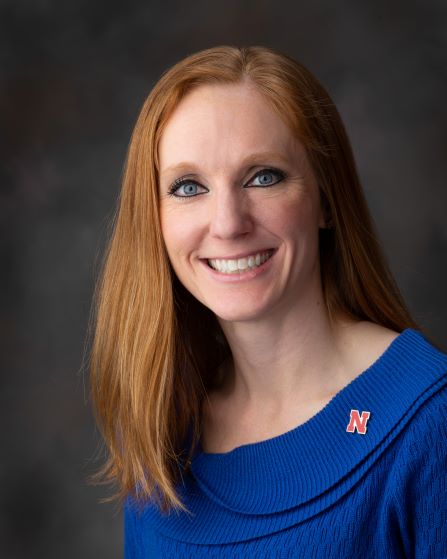
Complete Engineer Fellow
Primary Responsibilities
- Support college- and department-level activities related to ABET accreditation, including creating instructional materials, developing resources, and consulting on continuous improvement activities.
- Contribute to the scholarship of teaching and learning (SOTL) within the College of Engineering by supporting faculty, primarily through research design and analysis, measurement and assessment, and the dissemination of research findings.
- Coordinate and create assessment and evaluation processes for faculty development and co-curricular programs within the College of Engineering.
Education
- PhD (2018) - Educational Psychology, University of Nebraska-Lincoln
- MA (2014) - Educational Psychology, University of Nebraska-Lincoln
- BS (2012) - Psychology, Univeristy of Nebraska at Kearney
Bio
Markeya earned her Bachelor’s degree in Psychology from the University of Nebraska at Kearney, where she was a member of the volleyball and track & field teams. She earned her Master’s degree and PhD in the Cognition, Learning, and Development specialization in the Department of Educational Psychology at the University of Nebraska-Lincoln. Her research interests center on differences in undergraduate students’ motivation, metacognition, and self-regulation across authentic learning settings, and how those factors relate to learning and retention. Prior to joining the College of Engineering, Markeya worked as part of an interdisciplinary research team studying the impacts of specially designed learning exercises that integrate computational thinking and creative thinking. As a native of Wood River, Nebraska, she is a life-long Husker, and most of her free time is spent playing, coaching, and watching volleyball.
Select Publications & Presentations
- Flanigan, A. E., Peteranetz, M. S., Shell, D. F., & Soh, L.-K. (2022). Shifting beliefs in computer science: Change in CS Student Mindsets. ACM Transactions on Computing Education, 22(2), 1-24. https://doi.org/10.1145/3471574
- Gilmore, A., Daher, T., Peteranetz, M. S. (2021). A multi-year case study in blended design: Student experiences in a blended, synchronous controls course. Computers in Education Journal, 12(1), 1-20.
- Peteranetz, M.S., Soh, L.-K., Shell, D. F., & Flanigan, A. E. (2021). Motivation and self-regulated learning in undergraduate computer science: A multi-year program of classroom research. Institute of Electrical and Electronics Engineers Transactions on Education, 64(3), 317-326. https://doi.org/10.1109/TE.2021.3049721
- Ryu, S., Zhang, H., Peteranetz, M., & Daher, T. (2020). How fast can Evangelion run?: Application of scaling laws to the super robot. Superhero Science + Technology, 2(1), 5-12. https://doi.org/10.24413/sst.2020.1.5332
-
Peteranetz, M. S., & Albano, T. D. (2020). Development and evaluation of the Nebraska Assessment of Computing Knowledge. Accepted Frontiers In Computer Science. Manuscript ID: 515362. doi: 10.3389/fcomp.2020.00011
-
Ryu, S., Zhang, H., Peteranetz, M., & Daher, T. (2020). Fluid mechanics education using Japanese anime: Examples from “Castle in the Sky” by Hayao Miyazaki. The Physics Teacher, 58, pp. 149-152.
-
Peteranetz, M. S., Morrow, P. M., & Soh, L.-K. (2020). Development and validation of the computational thinking concepts and skills test. In Proceedings of the 51st ACM Technical Symposium on Computer Science Education (SIGCSE’20), (pp. 926-932). New York: ACM. doi: 10.1145/3328778.3366813
-
Peteranetz, M. S. & Soh, L.-K. (2020). A Multi-level Analysis of the Relationship between Instructional Practices and Retention in Computer Science. In Proceedings of the 51st ACM Technical Symposium on Computer Science Education (SIGCSE’20), (pp. 37-43). New York: ACM. doi: 10.1145/3328778.3366812
- Peteranetz, M. S. & Soh, L.-K. (2019). Building computational creativity in an online course for non-majors. In Proceedings of the 50th ACM Technical Symposium on Computer Science Education (SIGCSE’19) (pp. 442-448). New York: ACM.
- Peteranetz, M. S., Shell, D. F., Soh, L.-K., Ingraham, E., & Flanigan, A. E. (2018). IUSE computational creativity: Improving learning, achievement, and retention in computer science for CS and non-CS undergraduates. In Proceedings of 2018 ASEE Annual Conference & Exposition. https://peer.asee.org/30740
- Peteranetz, M. S., Flanigan, A. E., Shell, D. F., & Soh, L.-K. (2018). Future-oriented motivation and retention in computer science. In Proceedings of the 49th ACM Technical Symposium on Computer Science Education (SIGCSE’18) (pp. 350-355). New York: ACM.
- Luo, L., Kiewra, K. A., Flanigan, A. E., Peteranetz, M. S. (2018). Laptop versus longhand note taking: Effects on lecture notes and achievement. Instructional Science. doi: 10.1007/s11251-018-9458-0
- Peteranetz, M. S., Flanigan, A. E., Shell, D. F., & Soh, L.-K. (2018). Helping engineering students learn in introductory computer science (CS1) using computational creativity exercises (CCEs). Institute of Electrical and Electronics Engineers Transactions on Education, 61(3), 195-203. doi: 10.1109/TE.2018.2804350
- Peteranetz, M. S., Flanigan, A. E., Shell, D. F., & Soh, L.-K. (2018). Career aspirations, perceived instrumentality, and achievement in undergraduate computer science courses. Contemporary Educational Psychology, 53, 27-44. doi: 10.1016/j.cedpsych.2018.01.006
- Peteranetz, M. S., Flanigan, A. E., Shell, D. F., & Soh, L.-K. (2017). Computational creativity: An avenue for promoting learning in computer science. Institute of Electrical and Electronics Engineers Transactions on Education, 60(4), 305-313. doi: 10.1109/TE.2017.2705152